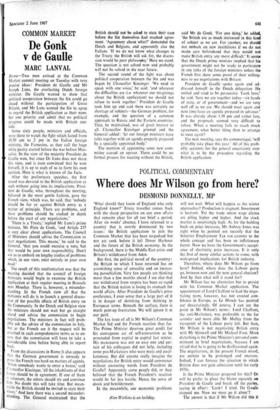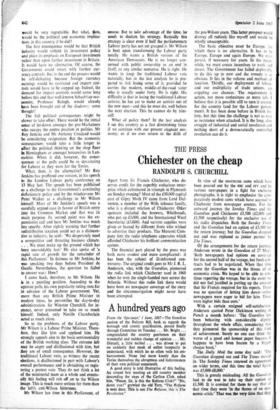Where does Mr Wilson go from here?
POLITICAL COMMENTARY DESMOND DONNELLY, MP
`What should they know of England who only England know?' Every traveller comes back with the sharp perspective on our own affairs that remains clear for all too brief a period. After six weeks' absence, I have returned to a country that is overtly dominated by two issues: the British application to join the Common Market that has been torpedoed but not yet sunk before it left Dover Harbour and the future of the British economy. In the background, there is the Middle East crisis and Britain's withdrawal from Aden.
But first, the political mood of the country: the Britain to which I have returned has an astonishing sense of unreality and an increas- ing parochialism. Very few people are thinking more than a few months ahead. I see also that our withdrawal from empire has been so rapid that the British nation is losing its stomach for world affairs. After President de Gaulle's press conference, I even sense that a large part of it is in danger of shrinking from thinking in European terms. Beneath the surface, there is much pent-up frustration. We will ignore it at our peril.
The key issue of all is Mr Wilson's Common Market bid and the French reaction thus far. The Prime Minister deserves great credit for his courageous act of self-conversion as he proceeded from capital to capital last winter. His manoeuvre was not an easy one and cer- tain of his colleagues did not help, including some pro-Marketeers who were mute and pusil- lanimous. But did anyone really imagine the negotiations for British entry would commence without answering words from President de Gaulle? Apparently some people did, or they believed that the French President's reaction would be far less hostile. Hence the sense of shock and bewilderment.
In the meanwhile, our economic problems Alan Watkins is on holiday. will not wait. What will happen as the winter approaches? Production is stagnant. Investment is hesitant. Yet the trade union wage claims are piling higher and higher. And the stock market is surprisingly high. As for the holding back on price increases, Mr Aubrey Jones was right when he pointed out recently that the Selective Employment Tax ran counter to the whole concept and has been an inflationary factor. Now we have the Government's accept- ance of electricity price increases. It is only the first of many similar actions to come, with widespread implications for British industry.
Therefore, where does Mr Wilson go from here? Indeed, where does the Labour party go, between now and the next general election? And by then what will it stand for?
Mr Wilson has no alternative but to persist with his Common Market application. The appointment of Lord Chalfont to lead the nego- tiating team, however, has not created con- fidence in Europe, as Le Monde has pointed out devastatingly. Of course, I can see the point in Mr Wilson's terms: Lord Chalfont, the anti-Marketeer, was preferable to the far sounder and more able Mr Mulley from the viewpoint of the Labour party left. But then, Mr Wilson is not negotiating British entry with Mr Shinwell and Mr Michael Foot. More disturbing is the Prime Minister's personal com- mitment to brief negotiations, because I am afraid that he is going to be disillusioned again. The negotiations, in the present French mood, are certain to be prolonged and onerous. Indeed, I can foresee the situation in which Britain does not gain admission until the early 1970s.
Is the Prime Minister prepared for this? Or will he prefer to place the blame squarely ea President de Gaulle and break off the parley, saying in effect: 'Look! I tried. De Gaulle stopped me. Now we must go it alone'?
The answer is that if Mr Wilson did this it
would be very regrettable. But what, then, would be the political and economic implica- tions in this country if he did?
The first consequence would be that British industry would rethink its investment policy and place its emphasis on European investment
rather than upon further investment in Britain. It would have no alternative. Of course, the Government could retort with further cur- rency controls. But in the end the process would be self-defeating because foreign currency earnings would be restricted and import con- trols would have to be stepped up. Indeed, the demand for import controls would come long before this and that well-known Schachtian eco- nomist, Professor Balogh, would already have been brought out of the shadows: some thought!
The full political consequences might be slower to take effect. There would be the initial sense of let-down amongst the pro-Marketeers who occupy the centre position in politics. Mr Roy Jenkins and Mr Anthony Crosland would be considering resignation. But the economic consequences would take a little longer to affect the political thinking on the shop floor in Birmingham or amongst housewives in Lan- cashire. When it did, however, the conse- quences at the polls could be as devastating for Labour as they were for the Tories.
What, then, is the alternative? Mr Roy Jenkins has proffered one version, in his speech to the London Labour party conference on 13 May last. The speech has been publicised as a challenge to the Government's continuing deflationary policy and by the mischievous Mr Peter Walker as a challenge to Mr Wilson ,himself. Most of Mr Jenkins's speech was a carefully argued case in favour of British entry into the Common Market and that was its
main purpose. Its second point was the ex- pansionist call and here Mr Jenkins was much
less specific. After rightly warning that further
redistributive taxation could act as a disincen- tive to industry, he said: 'We desperately need a competitive and thrusting business climate.
. . . We must make up the ground which has been unavoidably lost.' He also spoke of 'a
rapid rate of growth for the remainder of this Parliament.' In fairness to Mr Jenkins, he VMS speaking two days before President de Gaulle. Nevertheless, the question he failed to answer was: How?
I come back, therefore, to Mr Wilson. He is in a puzzling position. According to the
opinion polls, his own popularity rating runs far in advance of the Labour government. Yet, more than any British Prime Minister in
modern times, he personifies the day-to-day administration. Sir Winston Churchill, for in- stance, never presumed to take on so much himself. Indeed, only Neville Chamberlain acted as much alone.
So to the problems of the Labour party.
Mr Wilson is a Labour Prime Minister. There- fore, they like him and applaud him. He
strongly appeals also to the basic sentimentality of the British working class. The extreme left may be angry and disillusioned with him, but they are of small consequence. However, the traditional Labour vote, as witness the recent elections, is disillusioned in part with Labour's overall performance and is abstaining or regis- tering a protest vote. They do not think a lot of the ministerial team as a whole and eventu- ally this feeling will rub off on to the Wilson image. This is much more serious for them than the left's anti-Wilson bitterness.
Mr Wilson has time in this Parliament, of course. But to take advantage of the time, he needs to declare his strategy. Basically this strategy is clear even if half the parliamentary Labour party has not yet grasped it. Mr Wilson is bent upon transforming the Labour party totally. He wants a British version of the American Democrats. He is no longer con- cerned with public ownership as an end in itself, or any similar nonsense. He is right. He wants to keep the traditional Labour vote naturally, but in the last analysis he is pre- pared to risk losing some of it, provided he carries the modern, middle-of-the-road voter who is usually under forty. He is right. His difficulty is that in losing the traditional Labour activist, he has yet to make an activist out of the new man—and this he must do, well before the next election. This he cannot do by him- self.
What of policy then? In the last analysis I see this country as a fast diminishing force if we continue with our present stagnant eco- nomy; or if we ever return to the drift of
the pre-Wilson years. This latter prospect would dismay all radicals like myself and would be wholly unacceptable.
The basic objective must be Europe. for which there is no alternative. It has to he Europe, Europe and again Europe. We mu,: persist, if necessary for years. In the mean- while, we must create incentives to work and invest. The Government has failed deplorably to do this up to now and the remedy is so obvious. It lies in the volume and method, of taxation. Thirdly, our deployment of labour, and our multiplicity of trade unions. are crippling our chances. The requirement is action, not more committees or more talk. I believe that it is possible still to turn it around, for the country (and for the Labour govern- ment). It has been done before in British his- tory, but this time the challenge is not as easy as resistance when attacked. It is the long, slow struggle of industrial and social revolution and nothing short of a democratically controlled revolution can do it.



































 Previous page
Previous page